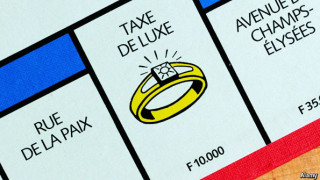
France now has a higher tax burden than any other country in the euro zone apart from Belgium. Germany’s overall tax take is fully six percentage points lower, and Britain’s over eight points behind. Even Sweden, emblem of the Scandinavian high-tax model, takes less in taxes than France. Historically, the French have tolerated high taxes as the price of decent public services and a proper universal safety-net. All those fast trains, first-rate hospitals and public crèches do not come for nothing, and the French are the first to defend a way of life subsidised by the public purse that can often only be bought privately in Britain or America. Moreover, the French make a firm distinction between taxes and social-insurance contributions. Only half of households have to pay income tax, but everybody pays social charges. If the French pay so much, goes the line, it is because of the insurance principle: generous unemployment benefits, for instance, are not a gesture of largesse by the French state but an insurance entitlement. Indeed, the longstanding tolerance for taxes has underpinned the solidity of French sovereign debt, since it is a fair bet that France’s government can efficiently collect the taxes it needs. When Gérard Depardieu, a film star,announced last year that he was leaving high-tax France, most of the French disapproved.
This social contract, however, could be on the verge of breaking down. Over the past year, as taxes on beer and cigarettes have risen, tax-free overtime abolished, tax deductions squeezed and tax-band thresholds frozen, even the French have started to grumble. Polls suggest that tax increases have become the top worry among voters, and chief reason for Mr Hollande’s calamitous popularity ratings. The sharp rise in taxes, which began under Nicolas Sarkozy, the previous president, as part of an effort to reduce the government’s budget deficit, is all the more resented at a time when the French are no longer convinced that their public services—underperforming state schools, overcrowded commuter trains—are so much better than those that cost less in other countries. What is the point of paying Swedish-style taxes (or more) if you do not receive Scandinavian-style public services in return?
The new mood has not passed the politicians by. Mr Moscovici acknowledged recently that the French are “fed up” with taxes. Mr Hollande even conceded in a television interview that tax increases have been “too much”. Most of the effort to reduce the budget deficit in 2014 will now fall not on tax increases but public-spending cuts. Mr Hollande has promised a “tax pause”, which will be part of the message in the 2014 budget. The idea of a pause, however, has not been defined. There is no talk of tax cuts. Instead, it seems to mean a slowing down of the rate of increase. So, if the government had been planning €6 billion of new taxes in 2014, an increase of only half that amount in today’s budget is to be regarded as good news. An unlimited French tolerance of taxes? Voters will deliver their verdict at local and European elections in six months’ time.


































